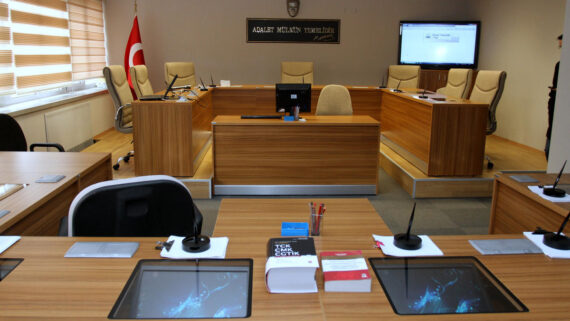The court has to make its own decision about whether an alleged fact is true or false in the light of the entire content of the proceedings and the conclusions it draws from any evidence. The party which, according to the rules of the burden of proof, has to adduce evidence of the fact at issue loses the case if it fails to discharge this burden. The court is obliged to explain the means of proof included in the verdict, as well as to provide the analysis used to include or exclude such proof. At Bicak, our lawyers have decades of experience in obtaining, preparing and deploying the various types of evidence used in court, including varieties of digital evidence that are increasingly critical to modern civil and criminal cases.
Evidence: Digital - Forensic
Evidence is crucial in civil, administrative and criminal proceedings. Evidence may be named as energy which is required for the justice system to function properly and to produce the right result. Evidence may include blood or hair samples, video surveillance recordings, or witness testimony.
Illegally obtained Evidence
If evidence is obtained illegally, such as during an unlawful police search, then that evidence (and any other evidence it leads to) may not be used at trial. Evidence that is deemed irrelevant or prejudicial to a case also may be deemed inadmissible. Additionally, evidence may be thrown out if the integrity of its handling (“chain of custody”) is in doubt.
Burden of proof
The main difference between the use of evidence in criminal and civil cases is the burden of proof. For a guilty verdict in a criminal trial, the prosecution must prove guilt “beyond a reasonable doubt.” But for a civil defendant to be found liable, the plaintiff generally need only prove culpability “by a preponderance of the evidence” (a lower threshold).
If you are a defendant in either a criminal or civil trial, your attorney may challenge and/or try to suppress evidence presented by the other party. One of your attorney’s most vital tasks is to find evidence that best supports your case.
Types of evidence are as follows;
Analogical Evidence is evidence that draws parallels between similar things and the facts attempted to be admitted. This is usually used when not much is known about the information in question, and is a pretty weak form of evidence. This can involve case studies and statistical reports.
Anecdotal evidence is evidence that is presented in the form of a story. This is usually given as testimony by someone who is testifying in a trial.
Character evidence is evidence that is used to reflect on the character of somebody. This can take the form of character witnesses, who testify as to the person’s character, or documents that can show a person’s past behavior or predisposition to certain actions or behaviors such as honesty.
Circumstantial evidence is evidence that relies on an inferential leap to make a conclusion. It does not directly establish the existence of a fact, but makes an implication that the fact exists. This type of evidence includes fingerprints at the scene of a crime or a witness sighting of somebody near the area of a where a crime took place.
Demonstrative evidence is evidence used to make a demonstration of something. This can include photographs, charts, drawings, or anything that makes a demonstration to the judge or jury to help them understand something in a case.
Digital evidence is any evidence that is stored electronically. This includes phone call or text messaging history or GPS location information. This information is typically acquired when electronic devices are obtained by law enforcement or when law enforcement asks for information from a company that stores the electronic information, such as a cell carrier.
Documentary evidence is evidence that is evidence presented in a documentary form, as opposed to physical evidence or testimony. This can include photographs, printed documents, or video.
Exculpatory evidence is any evidence that tends to show that a criminal defendant is not guilty. This can include an alibi or forensic evidence that does not belong to the defendant. Exculpatory evidence is required to be disclosed to the defense by prosecutors if the prosecutor comes across such evidence.
Forensic evidence is evidence that is obtained by scientific methods, such as DNA or blood.
Hearsay evidence is evidence that is secondhand, out-of-court testimony that is presented to prove the truth of something. One example is testimony about a statement that somebody who is not before the court made. There is a general rule against admitting hearsay evidence, but there are many exceptions to the rule against hearsay evidence.
Physical evidence is evidence that is physical or tangible. This includes fibers, footprints, fingerprints, or dental impressions.
Prima facie evidence is evidence that is not conclusive evidence of a fact but that tends to support or establish that fact. Prima facie evidence is usually presumed to establish a fact unless other evidence proves otherwise.
Statistical evidence is evidence that uses statistics to present a proposition or hypothesis. This includes statistics or statistical studies of all kinds.
Testimonial evidence is testimony given by a witness in court under oath. Testimonial evidence can be used as character evidence, to establish or dispute a fact, or can be presented by an expert who can testify about a certain issue in the case.
Distribution of burden of proof
In principle, in civil and commercial proceedings, each party bears the burden of proof for facts pertaining to the conditions of a rule of law in its favour. For this reason, the distribution of the burden of proof is often based on substantive civil law, as this contains bases of claim, auxiliary rules, legal defences and other objections. If a legal principle is fulfilled which assigns facts as a legal consequence to a claim (for example: conclusion of a contract of sale), it is generally the party deriving the claim from this (in the example, payment of a purchase price) which must present these facts (principle of production of evidence) and – if the opposing party contests them – must prove them. On the other hand, the opposing party must assert and prove entitlement to any opposing rights or objections (e.g. performance). If there is still doubt about an essential factual point after all the procedurally admissible evidence has been exhausted, a decision has to be taken about where the burden of proof lies. The party which, according to the rules of the burden of proof, has to adduce evidence of the fact at issue loses the case if it fails to discharge this burden.
In criminal law, the court must undertake a complete investigation to determine the factual truth. The court is not dependent on the evidence of the prosecutor, the accused, or the other parties. Witnesses can also be called on the court’s own initiative.
Presumption of innocence
The accused is presumed innocent. As a consequence, there is no obligation for him to prove that he is innocent. In contrast, the judge has the obligation to search for the factual truth, and only if he is convinced that the accused is guilty may he convict him. Thus, neither the public prosecutor nor the accused has the burden of proof in Turkish Law. If the accused or the public prosecutor points out any factual aspect that is necessary to decision during the course of criminal proceedings, the trial court has the obligation to determine the factual truth. A defendant can never be under a duty of self-incrimination; the right to remain silent is guaranteed.
Discussing all evidence during trial
Law does not restrict bringing any types of evidence as a means of proof. Everything may be considered as evidence insofar as it is reasonable. The court considers the evidence freely in order to discover the factual truth. However, evidence should have been obtained lawfully and the concerned parties should discuss all the evidence during trial. The judges may use only the evidence, documents and statements presented and discussed at the open trial to reach their conclusions and form the judgment of the court.
Our services
Our expertise means we can ensure all of the relevant evidence is collected and considered, allowing you to have the strongest defence possible and giving you the best chance of having charges against you dropped and avoiding prosecution, or achieving a successful outcome in court where proceedings cannot be avoided.
 English
English Türkçe
Türkçe Français
Français Deutsch
Deutsch



